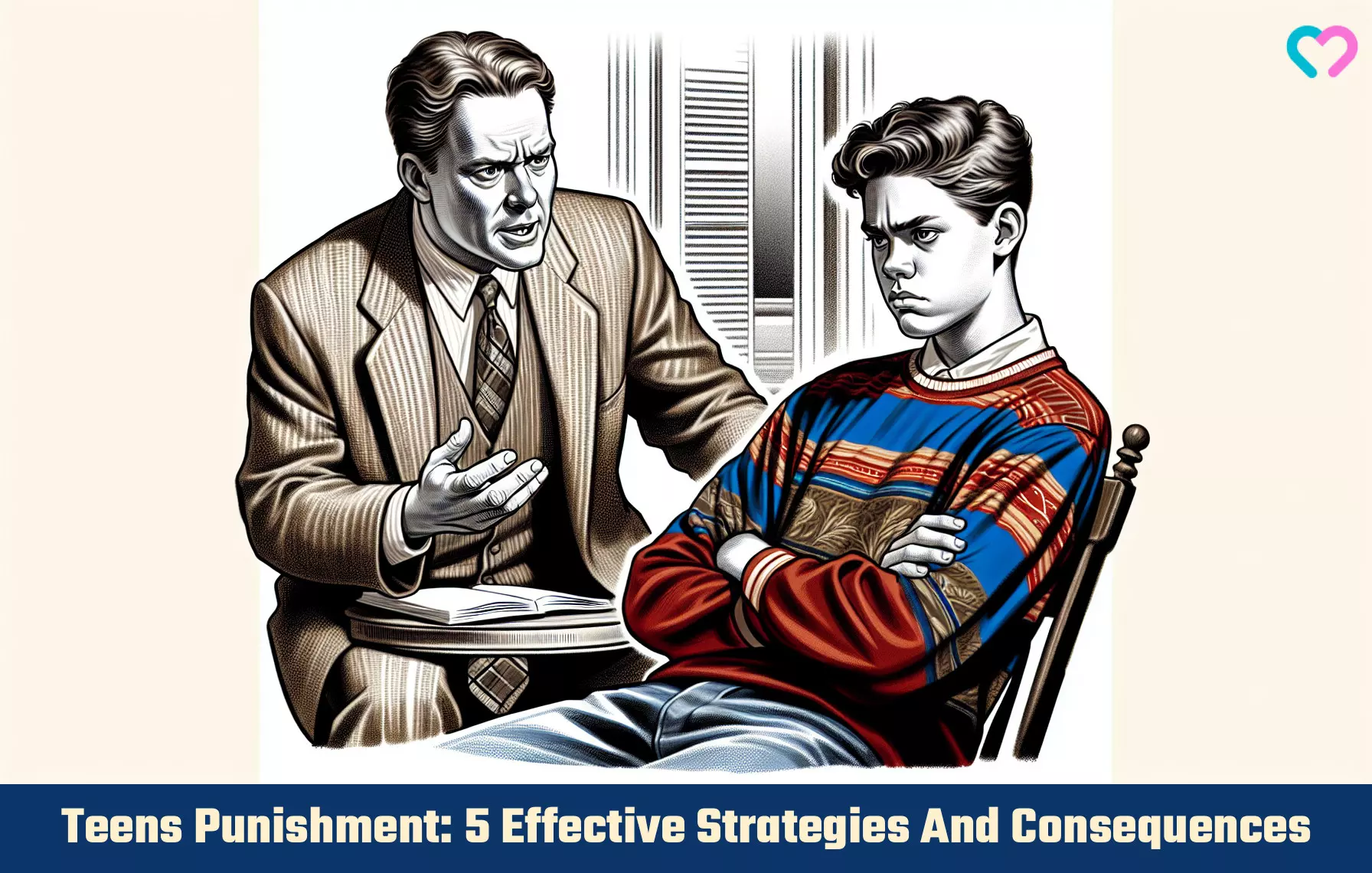
Image: Midjourney/ MomJunction Design Team
When it comes to punishments for teenagers, the first choice of most parents is deprivation, which is taking something that the teen may value. However, limiting everything can make a child more rebellious, and the parent-child relationship could deteriorate. You may understand that discipline is not about punishments, and it’s all about encouraging your child to behave in the right way.
The question of punishment often arises when a teen breaks the fundamental rule, and what they have done affects others. Although many parents feel that adolescents should face the consequences for their misbehavior, it is always better to explain what they have done and why they should not repeat the same thing. Hurtful punishments can backfire, and many teens tend to repeat mistakes with a willingness to accept the consequences.
It’s important to understand where teen behaviors emerge from. Teen behaviors tend to be influenced by hormonal or physiological changes and the psychological need for independence. It is also an important phase of self-discovery where they explore their equation with family, friends, and intimate relationships. Peer pressure and emotional fluctuations might also result in unruly teen behavior. Read on to know how to deal with teens’ behavioral problems and the dos and don’ts of punishments for teens.
Key Pointers
- Punishment is not always a part of discipline.
- Restricting access to technology, restoring the damage caused, or even having them tackle the situation on their own could all be effective punishments.
- Ineffective punishments include the use of discouraging comments or failure to discuss the mending strategies.
Are Punishments Good For Teens?

You should mete out age-appropriate punishments when your teen misbehaves to ensure they do not repeat it. Punishments work in some cases but backfire in others. If your parenting style is heavily reliant on severe punishment, it could deter the child from learning self-discipline. Also, a very heavy-handed punishment strategy could turn a teen rebellious and make them resort to lying or hiding things from you.
Carrie Krawiec, a marriage and family therapist from Troy, Michigan, says, “Consequences are intended to be a method to teach appropriate behavior by removing a desired item or privilege or adding a chore or inconvenience. Research shows that small consequences for small infractions are more meaningful for behavior change than levying big punishments. Big threats and consequences don’t work because often the parent cannot follow through.”
Punishments are necessary, and they do work when they are designed in the right way and with the right approach. When your goal is not to reprimand but to provide constructive criticism and ensure that they are empowered to make better choices or handle similar situations more effectively, the punishment you design will achieve its purpose. It is up to you to think of consequences that will benefit your teenager and guide them to display good behavior.
A good starting point is to get the teen’s active participation in setting up strong yet smooth house rules and impose appropriate punishments for breaking them. The teen’s involvement gives them control over the situation and encourages compliance.
 Point to consider
Point to considerHow To Design Appropriate Consequences For Teens?
Krawiec suggests, “Parents should explain early and often the expectations for appropriate behavior. I tell teens it’s okay to be mad but not bad— meaning bad behavior. If your child acts with hostility (not physically violent), give an appropriate direction and an opportunity to retry the behavior. For example, to a shouting teen, you may start with ‘make that statement with a lower volume.’ When they comply, offer verbal praise such as ‘thank you’.”
When designing consequences for bad behavior, keep the following points in mind:
- Consequence as a resolution to the act: Remember that your intent is to correct the teen, help them rectify their behavior, and understand the trouble they have caused. The best way to do this is to ensure that the sanction or punishment is aimed at correction. For example, a teen who breaks a neighbor’s window should apologize in person to the neighbor and get their window repaired out of their pocket money. While this may not always be possible, your aim should be to sync the consequence with the issue.
- Consequence in proportion to the misbehavior: Ensure the intensity of the consequence is in proportion to the problem or misbehavior. For example, the teen forgets to take out the garbage. Don’t overreact and ground them for a week. Instead, let them take the garbage out during the weekend.

However, if the teen resorts to violence in a tiff with peers, do not take it lightly and pass it off with a minor penalty. This needs a far stronger, more intense reaction and consequence proportionate to the gravity of the misbehavior.
- Consequence within the boundaries of self-respect: Never put down the teen or attack their self-confidence when meting out punishment. A consequence that is humiliating fails to teach the teen anything and only makes them rebellious.
Effective Punishment Strategies For Teens
As the parent, you know which punishments work best with your teen because you know their likes, dislikes, and preferences. Regardless, here are a few common and effective punishment strategies used by parents of teens.
- No access to electronics: If the teen ignores academics and remains glued to their cell phone for hours or if they present a very rude picture to guests during dinner by checking their social media updates constantly, a suitable punishment strategy is to get them to give up their phone privileges for a week.

 Quick tip
Quick tipThis works well with all electronic gadgets, especially if the teen’s favorite go-to gadget is their phone or laptop. The ‘no electronics’ punishment works well whenever the teen ignores you and their allocated chores and chooses to remain immersed in their digital world.
- Limited friend time: If your teen has been displaying undesirable behavior with friends, a good consequence would be a time-out from buddies. A stronger message would be to cancel their weekend outings with friends for a while.
- Stricter house rules: A house rule violation could mean that the teen loses some more freedom. This is a great deterrent and keeps the teen eager to comply with the house rules agreed upon. For example, if the teen breaks curfew by half an hour, set a new curfew that is half an hour earlier than your original one.
- Reparation as punishment: If the teen has been responsible for someone sustaining a loss, get the teen to make amends by repairing or replacing what was damaged. If the damage is not something that can be resolved this way, make the teen come up with a way to reduce the impact of the loss. For example, if the teen crashes into an elderly neighbor who sustains a sprain, as a result, let the teen take the neighbor to the doctor’s and also get essentials for them for a few weeks. Make sure the consequence is directly related to the issue.
- Facing the music alone: Let the teen handle the natural consequences of their actions without you stepping in and softening the blow. This is a great way to prep them for adulthood, when they have to face the music alone. Let them handle the angry neighbor who demands to know why the teen destroyed their flower beds or the car owner down the street who wants to talk to the teen about the scratches on his new vehicle from the teen’s cycle.
- Avoiding power struggles: Engaging in power struggles with your teen can lead to resentment and further behavioral issues. Instead, focus on collaborative solutions that respect their growing independence while maintaining necessary boundaries.
 Quick tip
Quick tipCommon Mistakes In Implementing Punishment
Parents can sometimes get frazzled and stressed with the teen’s latest escapade. This is when they tend to make mistakes when implementing a punishment or consequence. Here are some common mistakes that you should avoid.
- Using the wrong words: Saying things such as “I knew you would mess up,” “You are just like your useless uncle,” “You can’t do anything right” does not encourage the teen to listen to you. Instead, these statements might make the teen believe they are incapable of doing better. That’s not what you want.

- Failing to follow through: You tell the teen they would have to go without their phone for a week, but midweek, you give them their cell phone back. This tells the teenager that you do not seriously intend the punishment, and they need not take it seriously.
- Failing to mention the exact problem: Your teen needs to know why they are being punished. Are they losing driving privileges for taking the car out or for overspeeding? Tell them exactly what the problem is, so they know what will get them in trouble the next time and avoid it. When you set rules, make sure they are crystal clear, and there is no scope for the teen to misunderstand them.
- Setting consequences that don’t affect them: For a teen who loves solitude, being sent to the room may be a reward, not punishment. Fashion your punishment around your teen’s personality and characteristics, not your own or that of other teens you know.
- Not communicating how to make amends: The teen may deeply regret their action and would be keen on regaining the trust they lost. Tell them how they can do that. Once they do what it takes, put the incident behind you and do not keep bringing it up to taunt them.
Apart from avoiding these mistakes, always let the teen know that everyone messes up at times but gets second chances if they genuinely regret the mistake. Help the teen figure out why they committed the mistake, how not to repeat it, and what to do to stay away from a similar trouble in the future. The key to this is to have open communication with them, preferably once they are done with the punishment. This gives them time to retrospect and also understand the full impact of their action.
How To Help A Teen Avoid Punishments?
Just as it is your responsibility as a parent to correct your teen by meting out punishment when necessary, it is also your job to help them avert situations that call for punishment. Here are a few points that will encourage your teen to follow the rules and avoid punishment. Krawiec recommends, “Continue to monitor and supervise for healthy behavior. Reinforce expectations, brainstorm solutions for agreed-upon closeness, and set consequences for violations of expectations. Explain when trust is high, supervision can be low, and when trust is low, supervision must be high.”
- Maintain an open, friendly relationship with them: As a teenager, your child no longer depends on you for every task, but you can still play an important role in their life by taking an interest in their activities and doing things with them.
Activities that let you give them positive attention, such as playing a game they like or discussing a book or movie they love, can help set the stage for a sound relationship with them. When your teen shares a friendly, good relationship with you, the chances are they will discuss their problems with you without inhibitions.
Saliha, a mother of four, experienced challenges connecting with her teenage daughter. She reminiscences, “Sarah tended to withdraw and withhold information. However, I persevered. I began asking questions, gently probing her thoughts and feelings. Sometimes met with a “nothing’s wrong,” I learned to be patient and persistent.
“(I started) dedicating a special slot of time to Sarah. After I figured out a way around the dialogue drought, things began to loosen up a bit. Sarah would expect me to come to her room for the ritualistic dialogue. On a few occasions, if I didn’t make my way to her room as usual, she would take the initiative to come and find me instead. The more I engaged, the more she shared willingly or unwillingly, discreetly or blatantly, quietly or vocally. Gradually, the walls of secrecy began to crumble, and I am proud to say that our bond began to forge (i).”
- Be accessible: Let the teen know that if they need help or advice, they can reach out to you at any time. Be accessible enough so that the teen can quickly check in with you before taking up something important. You can always tell them specific hours when they cannot disturb you at work or ask them to message you if you are not reachable immediately. Make sure you respond as quickly as you can in such situations.
- Set a good precedent: Be a good role model for your teen. Take decisions that you want them to take in difficult situations and ensure they understand why you did something in a certain way. Involving them in the decision-making processes is a good idea because it gives them first-hand experience of how to factor in various aspects before taking action.

- Establish clear-cut rules: What you expect from your teen should be crystal clear, with no room for ambiguity. Write down the house rules for teenagers if necessary, along with the consequences that you arrived upon along with the teen. For example, ‘Be home by ___ pm on weekdays and ___ pm on the weekends.’ When the teen knows what is expected of them, they are more likely to remember and comply.
- Avoid arguing: A little bit of flexibility can go a long way in helping your teen toe the line concerning house rules. Avoid being rigid about rules, especially when you know it can lead to an endless argument. Settle for a reasonable compromise instead. For example, instead of arguing with your teen about taking out the garbage right away, give them a more flexible deadline, say before bedtime. However, make it clear that the deadline is non-negotiable.
Creating a respectful, empathetic environment at home also works magic in making teens behave well. After all, if they like being treated with consideration and respect, they have to prove themselves worthy of it too.
Most parents find dealing with a disrespectful teenager difficult, and punishment is often the last resort. However, as parents, you must recognize that punishing teenagers is not the same as punishing kids. Remember that teen punishment should not be harsh or sound like chastisement, and you should be careful about what you say. Teenagers must be approached with a greater level of understanding and calm. Setting certain ground rules and having adult, honest conversations with children can help them understand their errors and keep them from straying. In the end, they’re just kids going through the ups and downs of adolescence who, with proper guidance, can mature into responsible adults.
Frequently Asked Questions
1. What are some good punishments for teens?
One of the best punishments for teens could be letting them face the natural consequences of their actions. You can also try limiting their privileges to certain times or assigning them extra chores. Make sure the punishment comes across as a learning experience rather than a complex task imposed on them (1).
2. What are some examples of negative punishment for teens?
Negative punishment for teens include yelling at them, screaming at them, physical punishment (hitting), castigation, and harsh verbal discipline. Instead of teaching teens good discipline, these punishments can worsen the situation (2).
3. What are the benefits of using positive reinforcement instead of punishment?
Both positive reinforcement and punishment aim to discipline a child but use different methods. Positive reinforcement encourages children to behave better, while punishment commonly uses fear to stop children from misbehaving. The encouragement may come as a reward or praise and thus can motivate their future self. Therefore positive reinforcement may instill a sense of respect and love for the giver, unlike punishment, which may make the child resent or fear the person punishing them (5).
4. What are the cultural differences in how teens are punished?
Different cultures take up varied approaches to disciplining their teens or children. For example, countries like Kenya, India, the Philippines, and Italy use physical discipline or punishment. On the other hand, in countries like China, the majority of the population may be more inclined towards disciplining their children through reasoning or task-based punishments such as chores (6). This is somewhat similar to the approach parents use in the United States.
Infographic: What To Do If The Punishment Doesn’t Work?
Disciplining teenagers with punishments can be tricky. They are not young children and are smart enough to find a way around your techniques. So sometimes, your punishments may not yield the desired result and changes you might be expecting from your teen. So this infographic will help you stay a step ahead with some tips for when your strategies do not seem to work. Illustration: Momjunction Design Team

Illustration: Teens Punishment: 5 Effective Strategies And Consequences

Image: Dall·E/MomJunction Design Team
Improve your parenting abilities by acquiring knowledge on setting suitable consequences for your teenager. This concise video outlines five simple steps, offering valuable guidance to empower your teen in making smarter decisions.
Personal Experience: Source
MomJunction articles include first-hand experiences to provide you with better insights through real-life narratives. Here are the sources of personal accounts referenced in this article.
i. Parenting a teenager; confession, confusion, and connection.https://medium.com/@saliha_63069/parenting-a-teenager-confession-confusion-and-connection-c26a025ca4cb
References
- Appropriate Consequences for a Teen’s Bad Behavior.
https://middleearthnj.org/2014/01/13/appropriate-consequences-for-a-teens-bad-behavior/ - Yelling at teens reinforces bad behavior.
https://www.ahchealthenews.com/2013/09/06/yelling-at-teens-may-just-reinforce-bad-behavior/ - Discipline vs. punishment: What works best for children?
https://publications.aap.org/aapnews/news/8735?autologincheck=redirected?nfToken=00000000-0000-0000-0000-000000000000 - Appropriate Consequences For Teen’s Behavior.
https://middleearthnj.org/2014/01/13/appropriate-consequences-for-a-teens-bad-behavior/ - Reinforcement and Punishment.
https://pressbooks.online.ucf.edu/lumenpsychology/chapter/operant-conditioning/ - Jennifer E. Lansford et al.; (2009); Physical Discipline and Children’s Adjustment: Cultural Normativeness as a Moderator.
https://www.ncbi.nlm.nih.gov/pmc/articles/PMC2766084/
Community Experiences
Join the conversation and become a part of our nurturing community! Share your stories, experiences, and insights to connect with fellow parents.
Read full bio of Dr. Neha Mehta
- Carrie Krawiec has over 12 years of experience in Marriage and Family Therapy, practicing at Birmingham Maple Clinic. She is also a Parent Management Training-Oregon Specialist. Carrie holds an MS from Northwestern University and pursued BA in Psychology from Michigan State University.
 Carrie Krawiec has over 12 years of experience in Marriage and Family Therapy, practicing at Birmingham Maple Clinic. She is also a Parent Management Training-Oregon Specialist. Carrie holds an MS from Northwestern University and pursued BA in Psychology from Michigan State University.
Carrie Krawiec has over 12 years of experience in Marriage and Family Therapy, practicing at Birmingham Maple Clinic. She is also a Parent Management Training-Oregon Specialist. Carrie holds an MS from Northwestern University and pursued BA in Psychology from Michigan State University.
Read full bio of Bhavana Navuluri
Read full bio of Dr. Ritika Shah
Read full bio of Apoorva K


















